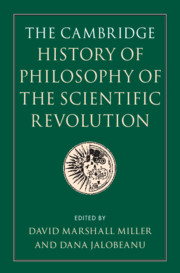Book contents
- The Cambridge History of Philosophy of the Scientific Revolution
- The Cambridge History of Philosophy of the Scientific Revolution
- Copyright page
- Contents
- Tables and Figures
- Contributors
- Preface
- Introduction The Disciplinary Revolutions of Early Modern Philosophy and Science
- Part I The Disciplines
- 1 The Uses of Ancient Philosophy
- 2 Novatores
- 3 Renaissance Aristotelianism(s)
- 4 What To Do With the Mechanical Philosophy?
- 5 The Later Sects: Cartesians, Gassendists, Leibnizians, and Newtonians
- 6 Confessionalization and Natural Philosophy
- 7 The Rise of a Public Science? Women and Natural Philosophy in the Early Modern Period
- Part II Disciplinary Activities
- Part III Problems and Controversies
- Bibliography
- Index
1 - The Uses of Ancient Philosophy
from Part I - The Disciplines
Published online by Cambridge University Press: 14 January 2022
- The Cambridge History of Philosophy of the Scientific Revolution
- The Cambridge History of Philosophy of the Scientific Revolution
- Copyright page
- Contents
- Tables and Figures
- Contributors
- Preface
- Introduction The Disciplinary Revolutions of Early Modern Philosophy and Science
- Part I The Disciplines
- 1 The Uses of Ancient Philosophy
- 2 Novatores
- 3 Renaissance Aristotelianism(s)
- 4 What To Do With the Mechanical Philosophy?
- 5 The Later Sects: Cartesians, Gassendists, Leibnizians, and Newtonians
- 6 Confessionalization and Natural Philosophy
- 7 The Rise of a Public Science? Women and Natural Philosophy in the Early Modern Period
- Part II Disciplinary Activities
- Part III Problems and Controversies
- Bibliography
- Index
Summary
Throughout the early modern period, the vast majority of natural philosophers remained deeply invested in exploring the meaning of ancient philosophical texts—there was no anti-humanist turn initiated by Descartes. Discussion of ancient philosophy was used, above all, in a genealogical manner, to shed light on the historical origins of doctrinal or methodological error. Accordingly, calls for a “return” to the philosophy of the presocratics, of Hippocrates, etc., should not be understood as simplistic recourse to authority, but rather as historico-methodological arguments about the disciplinary identity of natural philosophy. Indeed, natural-philosophical innovators were often more sure of what they stood against than what exactly they stood for. Seen from this perspective, the “philosophy of the Scientific Revolution” was an anti-philosophy, driven primarily by the colonization of the discipline by physicians on the one hand and mixed mathematicians on the other; the two groups eventually coming to work in tandem to squeeze out anything that looked like metaphysical physics.
- Type
- Chapter
- Information
- Publisher: Cambridge University PressPrint publication year: 2022

